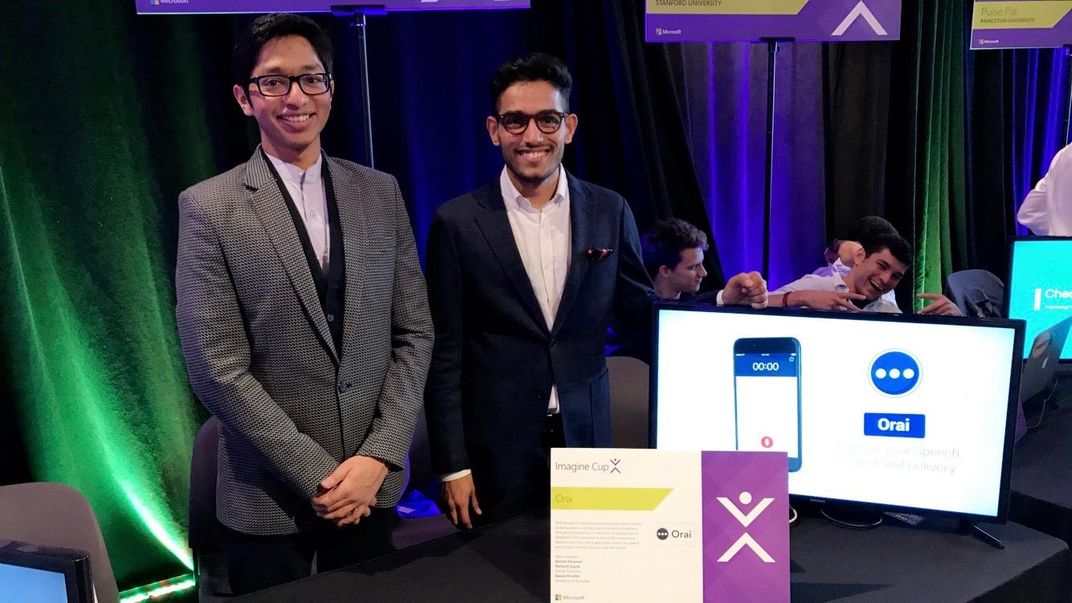An App to Make You a Better Public Speaker
Orai, created by two college students, uses AI to help people become more fluent, confident speakers through consistent practice and feedback.
/https://tf-cmsv2-smithsonianmag-media.s3.amazonaws.com/filer/77/09/7709583a-ae02-4a70-a9e5-0faf6e3b5bf8/orai_3_phones_big.png)
When Paritosh Gupta and Danish Dhamani met, as freshmen dormmates at Drexel University in Philadelphia, they had a lot in common. They were both studying STEM—Gupta in computer science, Dhamani in mechanical engineering. They both attended many of the same campus events, especially networking ones. And they both spoke English as a second or third language – Gupta grew up speaking Hindi in India, while Dhamani grew up speaking Urdu and Swahili in Tanzania.
It was this last fact that made both of them somewhat uneasy with public speaking. Dhamani often felt uncomfortable speaking in public in general, while Gupta had trouble with professional communication. At an internship, he hesitated to speak up with ideas because he felt he wasn’t articulate enough.
“If I could communicate more effectively, I could make so much more of a difference,” he recalls thinking.
The two joined Toastmasters, a nonprofit club that helps members with communication and public speaking. They found the group so helpful they began to wonder if they could create a technology that could offer similar teachings to everyone, everywhere.
So the two put their skillset together and built Orai, an app for improving public speaking. Built in consultation with linguists, neuroscientists and public speaking experts, it analyzes users’ speech for three critical factors. First, it looks for the overuse of “filler words”—the "ums," "uhs," and "likes." There’s pacing – how fast you’re talking. Then there’s energy, which has to do with vocal variation, the changes in pitch or volume that make speeches sound interesting. “Some speakers with great content fail to create that impact in their audience because the speaker didn’t have the right energy level to engage,” Gupta says. Then, the app presents users with feedback and tips to improve.
The app is built as a training device, something to be used regularly, over time, for incremental improvements.
“We talked to a lot of speech coaches and trainers, and good public speakers, and asked about their journeys—how did they grow to become good public speakers,” Gupta says. “A lot of them said it was like going to the gym; it doesn’t happen in one day.”

Orai, which is free, was launched in March after several months of beta testing. So I downloaded it and gave it a try. The app offers several prompts to get you started. I chose “Your Favorite Things,” which suggested I talk about my favorite food, restaurant or place to go on a Friday night. So I hit the record button and enthused about my favorite ramen spot for the suggested 60 seconds. When I was done, a feedback page popped up immediately. I was congratulated for not using a single filler word—hooray! My speech clarity—the percent of words the app was able to understand—was 80 percent, also good. My pace, 140 words a minute, was in the ideal range according to the app’s speedometer icon—under 100 words a minute is too slow, while over 150 is too fast. I had four vocal variations in the 60 second clip, also ideal. “Looks like you’ll be hosting a TED Talk in no time,” the app told me.
Gloating slightly, I tried a second prompt. This one, called “Job Interview,” asked me to talk about my professional experience, achievements, strengths and weaknesses for five minutes, as if I was in a job interview. As soon as I pressed record, I began to feel nervous, the way I really would if I were actually interviewing for a job. My mind suddenly blank, I struggled to list my achievements, leaving long pauses between sentences. I ended the recording less than two minutes in, though the prompt suggested talking for five. This time, the feedback was a bit more critical. I used eight filler words, all "um." Not terrible, but could be better. My speech clarity was 82 percent, so still OK. But my pacing had dropped to 82 words a minute, far too slow. “A good way to increase your pace is to organize your thoughts, and think about what you’re going to say before you speak,” the app advised. Too true.
To encourage regular use, Orai rewards achievements with trophies. If you improve enough, you can unlock all the trophies. It also lets you choose practice days, and sets reminders. The app records the length of your “streak” – how long you’ve actually practiced on days you’ve previously committed to.
Orai tracks its current users to see how well they’re doing.
“We’ve seen some significant improvement in the way they’re delivering their prompts,” Gupta says.
Gupta and Dhamani are working on several updates to the app. One update will offer modules based on different topics, such as the use of pauses. The other update will be the use of video, so the app can track things like posture and facial expression.
“Smiling when you’re speaking is one of the most important things because it conveys that you’re intelligent and you want to say something important to the audience,” Gupta says.
The app has generated a bit of buzz in business circles already. Orai has been one of the finalist teams in Microsoft’s Imagine Cup and the Conscious Capitalism Student Business Plan Competition, winning $40,000 in prize money so far.
It’s a lot of work, especially given both Gupta and Dhamani are still full-time college students—Dhamani will graduate this year, Gupta will graduate next year.
“This is our full-time thing,” Gupta says. “Even with college. I spend as much time, if not more, on this.”
/https://tf-cmsv2-smithsonianmag-media.s3.amazonaws.com/accounts/headshot/matchar.png)
/https://tf-cmsv2-smithsonianmag-media.s3.amazonaws.com/accounts/headshot/matchar.png)